Everything You Need To Know About Commercial Battery Storage
The increasing emphasis on sustainability and environmental awareness drives industries to prioritise these values. For many sectors, energy bills represent a substantial portion of their expenses. Consequently, numerous industries are adopting solar power by integrating solar PV panel systems into their buildings. These systems are complemented by commercial battery storage technology to store and utilise energy efficiently.
A commercial battery storage system (BESS) allows you to continue using solar stored power when the panels cannot generate energy from the sun, such as during night-time or on cloudy days, thereby ensuring a consistent energy supply.
At Excel Energy, we have over 30 years of experience in providing renewable solar energy solutions to businesses. With every installation, we have witnessed the impact of battery storage technology on companies. This blog will provide everything you need about commercial solar energy storage to help you decide whether to incorporate it into your solar PV panel system.
What Is Battery Storage Technology?
Battery storage technology is a system that stores electricity for later use, allowing energy generated from sources like commercial solar panels or the grid to be used when it is needed most rather than when it is produced.
In most cases, not all energy from a solar panel system is used as it is being produced at peak times.
So, instead of being exported at cheap SEG rates, commercial battery storage technology stores the excess energy generated, ready for usage when the system generation reduces.
These batteries work similar to rechargeable batteries that we use for common battery-operated items.
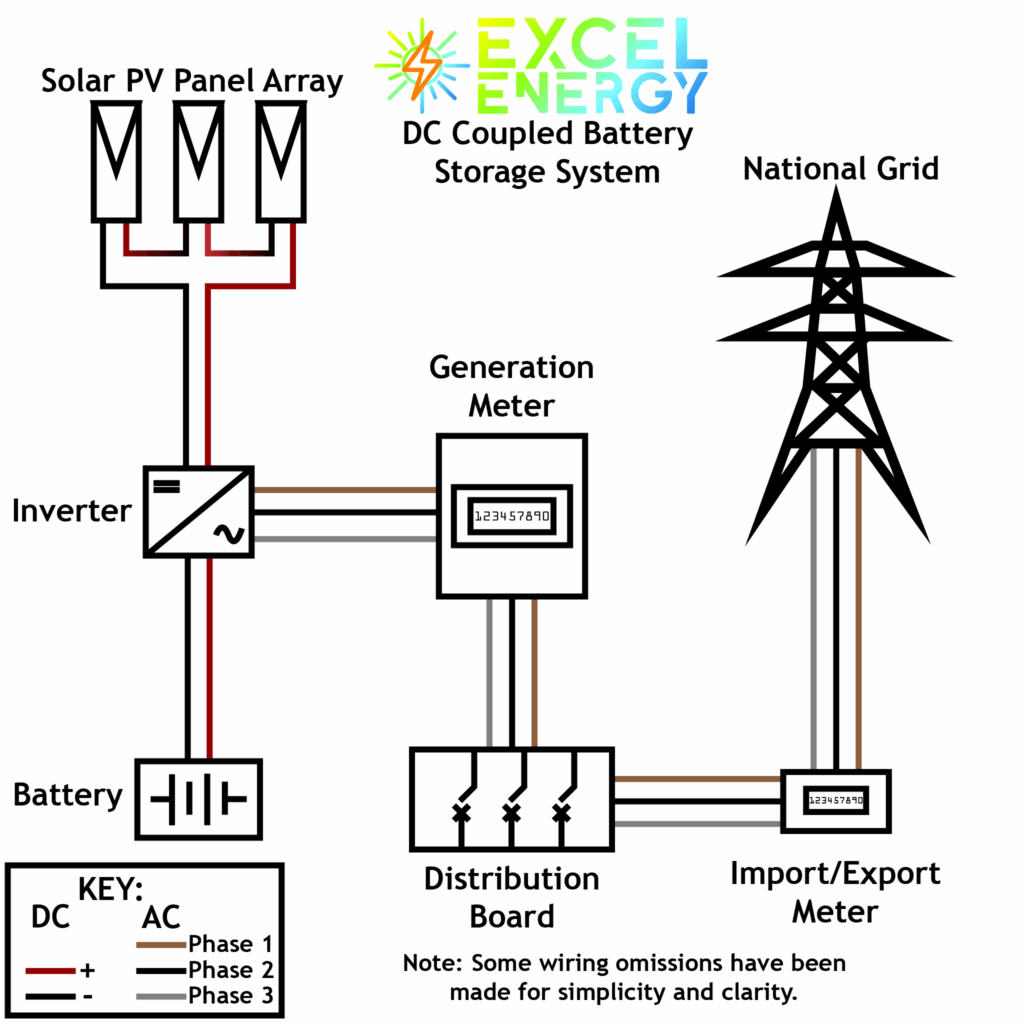
DC Coupled System
A DC-coupled system is a solar energy setup where the solar panels and battery storage are connected on the direct current (DC) side of the system, before the electricity is converted to alternating current (AC) for use.
DC-coupled storage is connected to the DC side of a PV system, directly between the PV modules and the inverter’s DC input. These systems monitor your business energy levels, utilise surplus energy to charge the batteries during the day and discharge them when energy consumption exceeds production levels.
For example, a string-connected storage battery would not be suitable for use with a SolarEdge PV inverter, as this would cause issues with the optimiser technology.
Users should always check manufacturer compatibility documents to ensure the compatibility of inverters and batteries.
Due to the reliance on DC-coupled storage on surplus PV generation to charge the batteries, it is essential to size the battery carefully, considering specific electrical loads and the energy profile.
Oversized DC-coupled batteries can be at risk of remaining at low charge during winter when production is generally lower, leading to cell degradation and reduced efficiency and equipment life.
Even small batteries on large PV systems may only be charged if consumption consistently exceeds daily production levels.
AC Coupled System
An AC-coupled system is a solar and battery setup where the solar panels and the battery each have their own inverter, and both connect to the building’s AC (alternating current) electrical system.
An AC-coupled storage system still needs a DC battery, but it is on the property’s AC side. In this setup, a battery will be connected to an AC-coupled inverter, which acts in reverse of a typical PV inverter, converting AC to DC so that the battery can store it. AC energy can be supplied from the grid or an existing PV inverter on the property, depending on the system’s mode of operation.
Energy is subject to conversion losses during the charge and discharge process, but these losses are minimal, only 5-7% more than those of their DC-coupled counterparts. Despite the higher losses, AC-coupled storage systems are still very popular due to the flexibility they offer grant installers and end users regarding the planning, installation, and operation of their storage systems.
For example, when proposing DC-coupled storage, remember that it must be connected to the PV inverter’s DC strings. If the existing PV inverter is installed in a loft, this environment will likely be unsuitable for a storage system due to space, temperature, or ventilation.
On the other hand, AC-coupled storage does not need to be connected to the DC circuit between the inverter and panels, so it does not suffer from such restrictions.
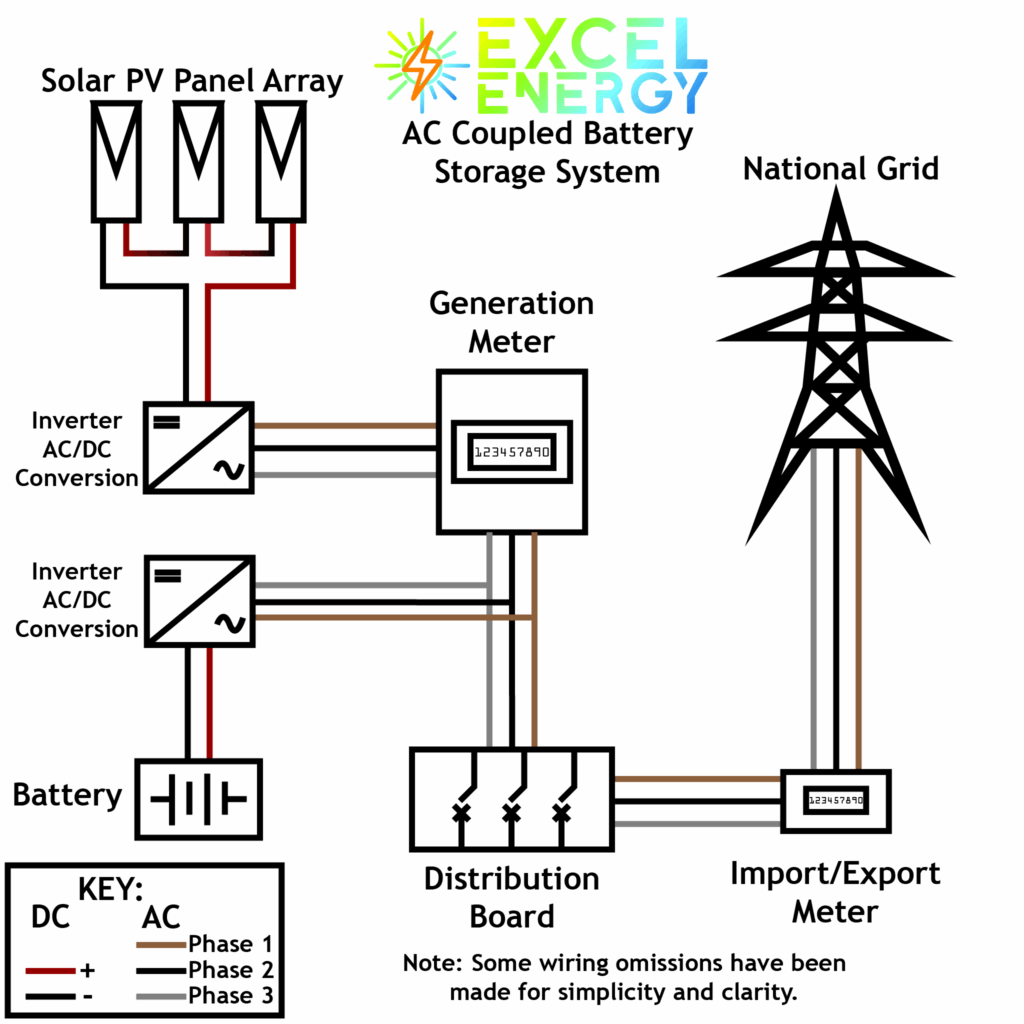
Advantages and Disadvantages of DC and AC Systems
DC
- Often cheaper for small systems – equipment and install.
- High efficiency.
- Can avoid G98/G99 application process if rated AC output of existing system is unaffected.
- Compatibility required between battery, string connected DC charger, and PV inverter.
- Potential storage capacity is restricted to volume of surplus PV energy.
- Must be installed on DC side of inverter – may be hard depending on location of existing inverter.
AC
- Can be charged with energy supplied by a local PV system(s) or the grid. Meaning greater flexibility when planning storage capacity.
- More flexibility proposing location of storage system within the property.
- Is considered an individual PPM and so permission must be sought from the DNO under the relevant classification depending on aggregate AC output of combined PPM’s installed.
- Can often be more expensive due to the requirement for the AC coupled inverter.
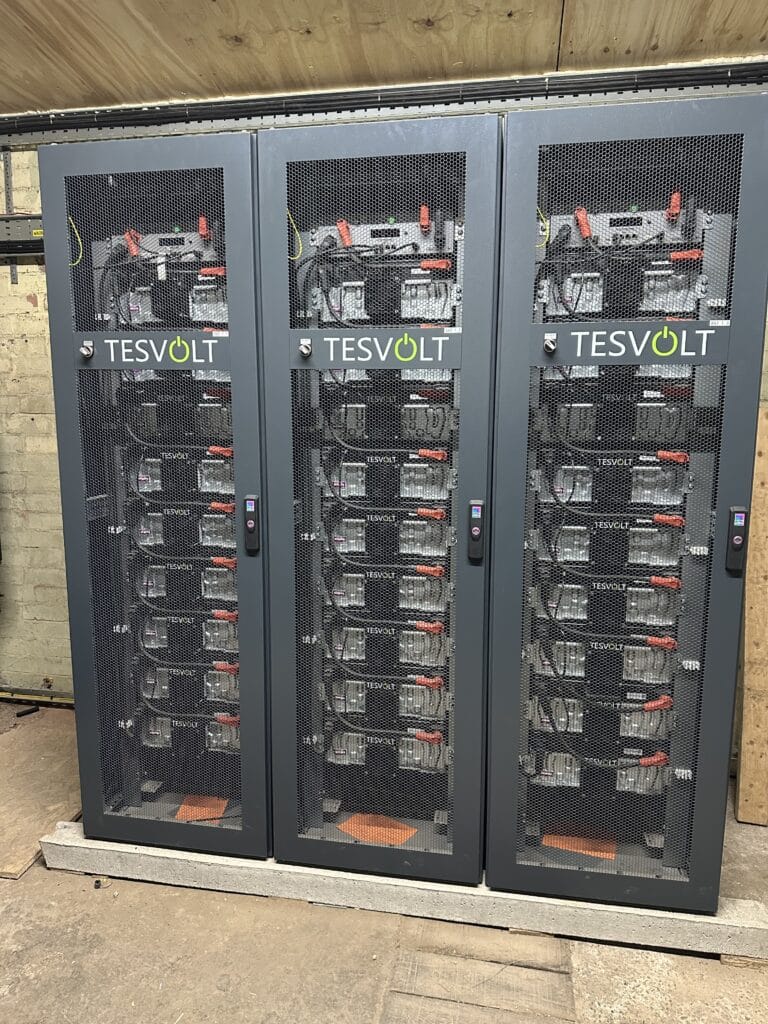
Hybrid Inverters
Hybrid inverters combine many of the advantages offered by AC and DC coupled storage to provide a solution that is both flexible and cost-effective. A Hybrid inverter is a PV inverter with a battery charger rolled into one unit.
Batteries are still connected on the DC side but can be charged from the AC supply; there are fewer restrictions when it comes to battery sizing than when only working with surplus PV energy. Also, regardless of the battery capacity, your system size is determined by the rated AC output of your Hybrid inverter.
A good example would be the GoodWe Hybrid 50kw hybrid inverter with Tesvolt 128KWh battery modules. When connected to a 3PH supply, this inverter will push out over 72.2Amps or 16.53kWh per phase, meaning that it can be connected under G99 regulations with DNO permission, which determines what can be exported back to the grid.
Combining this technology inside one machine reduces the cost of equipment and labour whilst speeding up the time it takes to install. As all the processing power takes place inside one unit, there is no need to worry about equipment compatibility, saving one more headache during the planning stage.
The significant disadvantage of most Hybrid inverters is that they are first and primarily PV inverters and require PV to energise and operate. Also, an existing PV system on a property is looking for storage. In that case, you may have difficulty justifying the removal of a working PV inverter and replacing it with an equivalent Hybrid.
This is why, for existing systems, it may be wise to consider a retrofit; for new storage inquiries, a Hybrid solution offers the most advantages.
Advantages of Commercial Solar Storage batteries
Installing a commercial battery storage with your solar PV panel system allows your business to continue to benefit from this renewable energy source in several ways.
Energy Independence and Reliability
By remaining dependent on the solar power system, you gain control and independence from the National Grid, reinforcing your business’s security and stability.
Capabilities to charge battery off-peak at Cheaper rates during the night, then use energy during peak times when PV generation may not be as good.
Excel Energy supply battery storage solutions from multiple suppliers including SolarEdge, Tesvolt and BYD.
You demonstrate financial savvy and strategic thinking by selling your energy during peak hours at a high rate, such as Octopus’s current peak sell rate of 0.40p.
Cost Savings
By extending the time you rely on your commercial solar panels and reducing dependence on the National Grid, you demonstrate financial prudence and responsibility by reducing bills from third-party energy suppliers.
This is especially true with a solar battery storage unit, which helps you stay independent at peak energy consumption times.
Environmental Benefits
Of course, relying more on solar panels than fossil fuels for energy generation has many environmental benefits, making your company environmentally friendly.
Reducing reliance on the National Grid means you reduce your business’s use of fossil fuels, which decreases your carbon footprint and emissions.
Not only does this contribute to a healthier environment, but it increases your business’s reputation as an eco-conscious company.
Greater Efficiency
A final benefit of adding battery storage technology is that it optimises your solar power system by allowing you to use as much energy as possible.
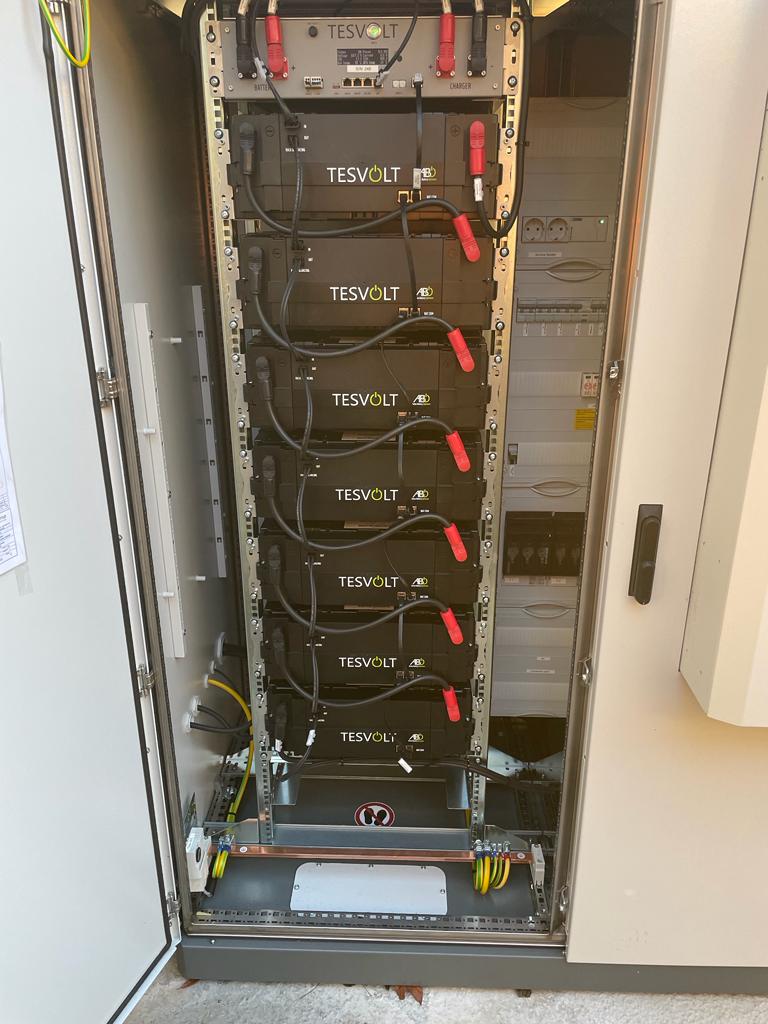
Considerations for Commercial Solar Battery Storage
High Initial Costs
Maintenance and Lifespan
In order to perform at their optimal levels for as long as possible you will need to take care of these systems. This means regular services and maintenance from professionals to prevent major issues.
Space Requirements
The chances are that to meet our business’s energy demands you will need more than one energy storage unit.
Each unit can be a reasonable size, meaning that you will need a dedicated space for these storage batteries where they will be out of the way yet reachable for installation and maintenance.
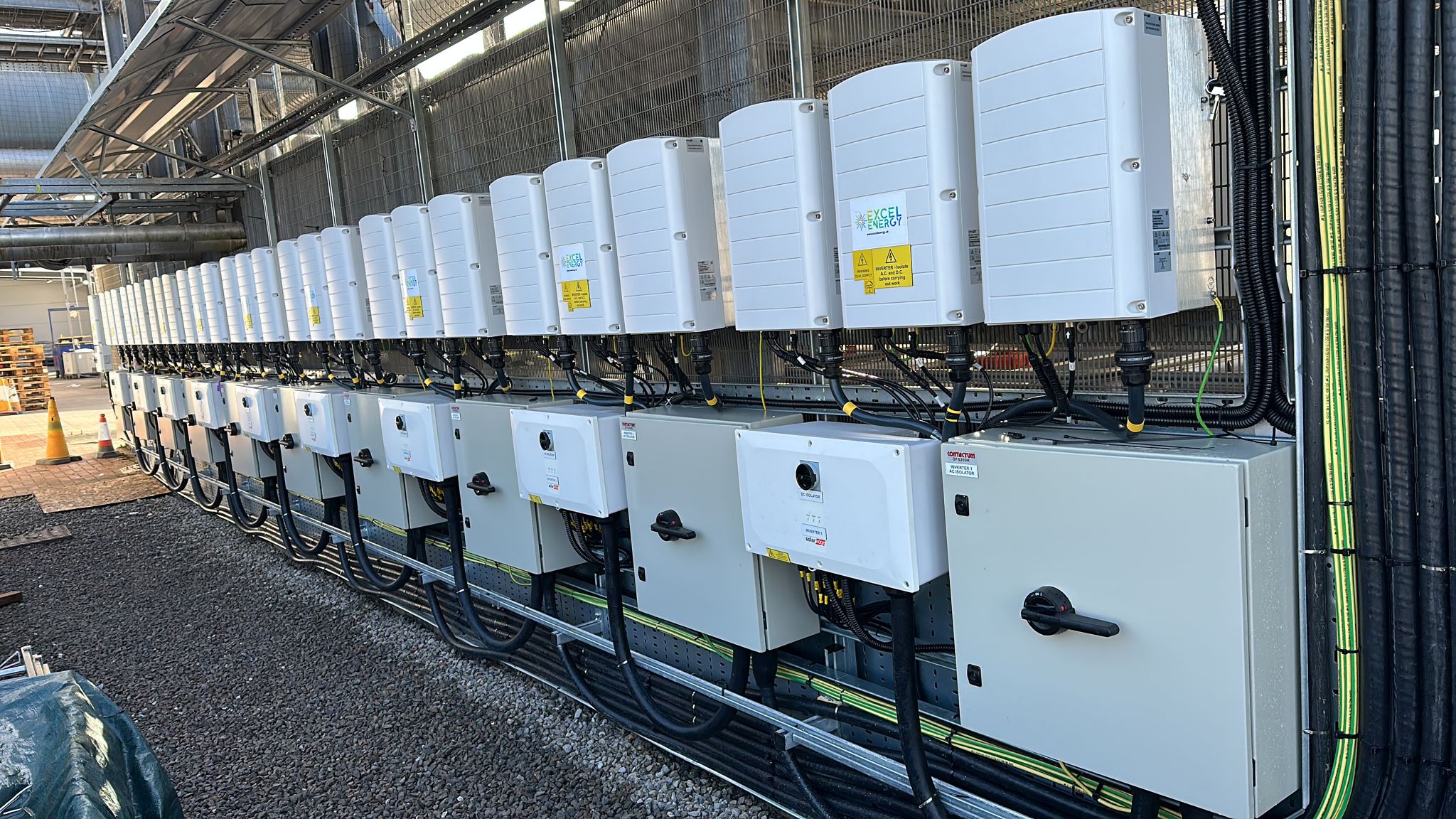
What To Consider When Deciding To Include A Commercial Solar Battery
When considering whether you want to install a commercial solar battery with your solar PV panel system you should follow the considerations.
- Evaluate the commercial solar battery cost versus its benefits and potential cost savings
- Assess your energy needs and usage patterns to discover how much energy you will need during off-peak production times
- Research solar panels and battery storage systems to get an idea of what is available, their capabilities and costs.
Speak To Our Experts
So, there you have it, everything you need to know when deciding to add commercial solar storage to your PV system.
The team at Excel Energy are specialists in commercial solar panel systems and have worked within a range of sectors including medical manufacturing, farming and agriculture, warehouses and construction. This is just one of the reasons why they are becoming the leading commercial solar installer across the UK because it means they understand the demands of energy-intensive businesses and can give advice and recommendations that are relevant and helpful to your business needs.
We ensure we keep up-to-date with relevant regulations and standards within the industry and have several accreditations to demonstrate our commitment to this.
If you would like to discover more about battery storage systems or discuss integrating one with your new or existing solar panel system, give us a call at 020 3834 9440 or complete our online contact form to request a callback.
